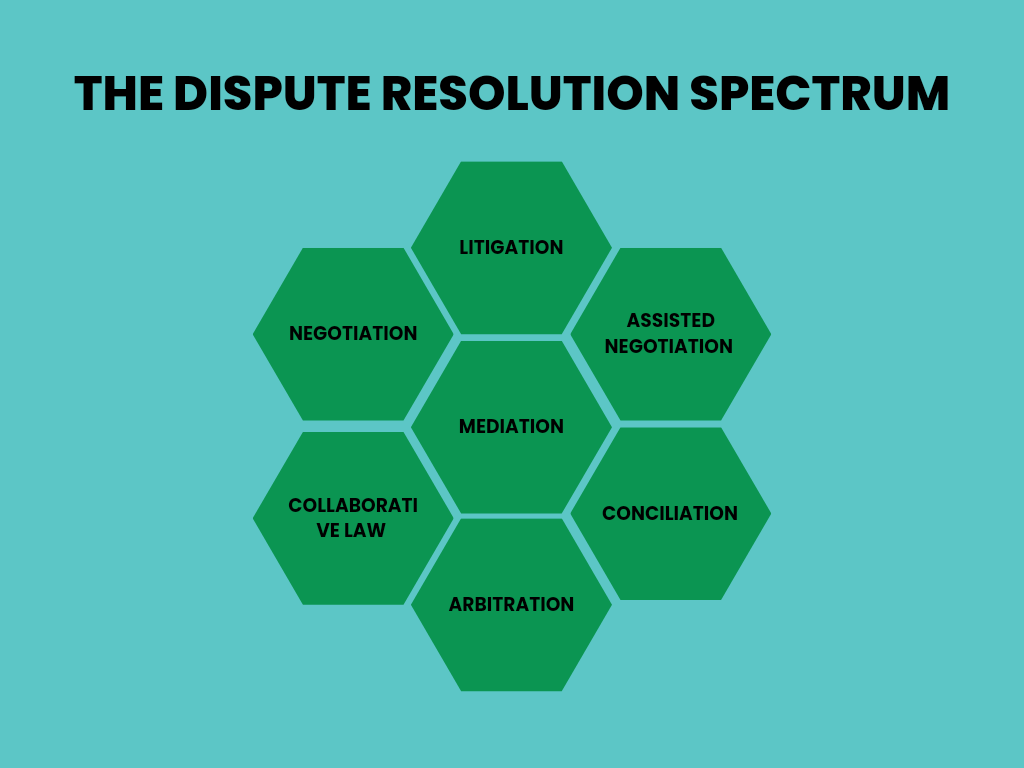The spectrum of dispute resolution systems
There are multiple dispute resolution systems. The system you choose to adopt often determines the outcome of the dispute and how satisfied you are with it. So, friend, choose wisely.
In my experience, disputes are a natural and inevitable part of life. To a large extend, the way in which disputes are managed and resolved determine the quality of one's life. Successfully winning a dispute ends results in a resolution that ensures all your interests are protected.
They must never be mismanaged or left unresolved. Unresolved disputes accumulate and become long, drawn out conflicts which can result in severe damage to relationships, reputation, health, wellness, and deplete all resources in life. In a sense, it's like a festering wound, if you leave it untreated, you might eventually have to ampute the organ.
Disputes can be resolved using a judicial process, a semi judicial process or a non judicial process.
Litigation is a judicial process which involves approaching a lawfully constituted court of competent jurisdiction with evidences and arguments supporting ones interests to pray for a relief/remedy. This may be a voluntary or non voluntary process as far as any of the parties are concerned. And herein lies the problem with litigation in keeping a relationship intact. Because these parties are constrained to relying on arguments and evidences for advancing their interests, it becomes a mud slinging exercise. In the end, it leaves both parties dirty and scarred.
In my brief career in litigation that lasted half a decade, only rarely have i witnessed litigants be completely satisfied with the outcome of the case. And, i had always wondered why. I found the answer when one of my senior mentors, Mr. Anil Xavier, narrated a story in one of my first sessions of the professional mediator training program. Litigant pleading for justice before a judge is like a three year old boy who asks his father for a tricycle. Years pass as the father tries to find the perfect tricycle,and when he finally finds it, the boy is all grown up and wants a Harley Davidson instead.
On the other end of the spectrum, disputes can also be resolved using non judicial methods. This is perhaps the most widely attempted approach. But the problem here is that non judicial methods like social and community intervention are unregulated and highly unstructured. They are also extremely risky and highly erratic in the sense that the value of the resolution arrived is solely dependent on the status that the individual/body holds in the community at any point in time. Status based resolutions are primarily motivated by fear or respect, and are rarely lasting. As such, the moment such status changes, so does the value of the settlement.
Arbitration and Mediation are semi judicial processes. Arbitration is a toned down version of litigation but is much more speedier. But Arbitration is also fairly expensive and usually unaffordable for the common man.
Mediation on the other hand, is more of an informal process. It is a completely voluntary process. In a way, it is a structured form of negotiation assisted by a neutral third party. As Iram Majid Ma’am who mentors me in the world of ADR says, a good mediation is one in which the mediator through the skill, creates and adds value to the resolution that is negotiated. Effective mediations strengthen a relationship and creates lasting peace and harmony.
Here's a small comparison of the five main dispute resolution systems with respect to cost, satisfaction, time consumed and impact on relationships. As you can see, mediation is one of the most ideal methods of resolving disputes.
How do you resolve disputes in your life? Let me know. If you feel that this will benefit any of your followers, please feel free to share and spread the love. Thank you for your time.



